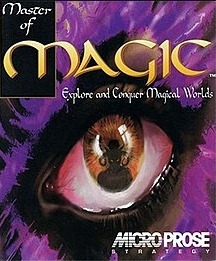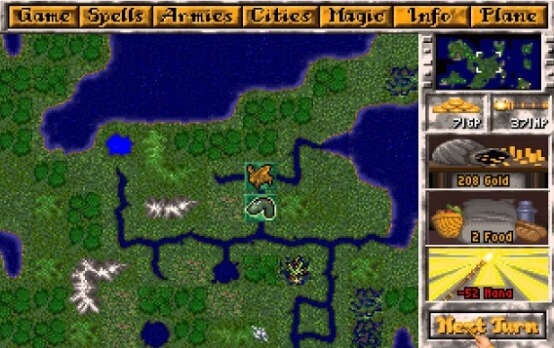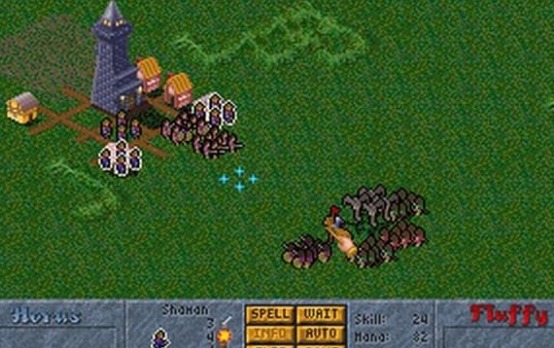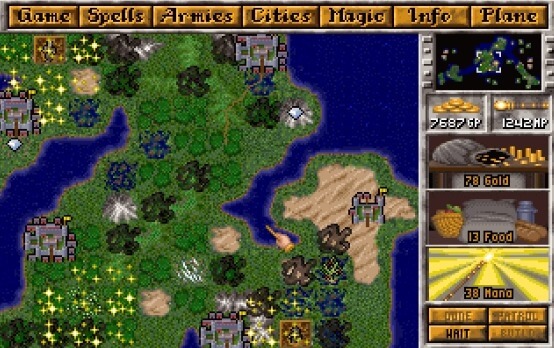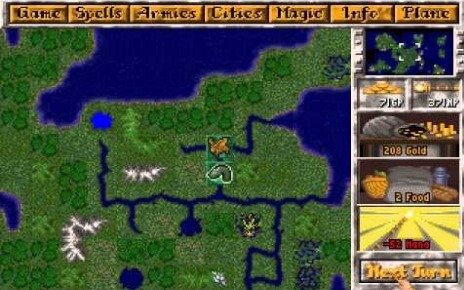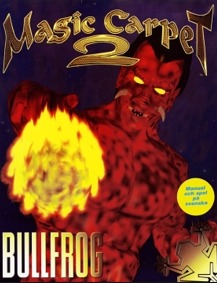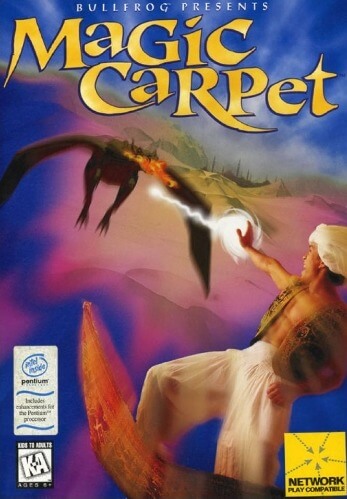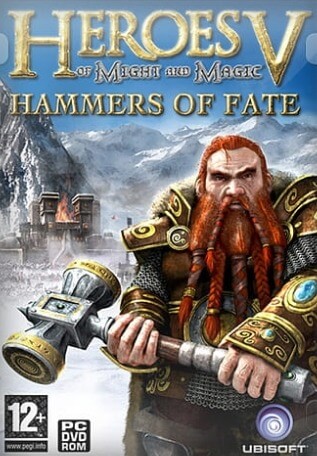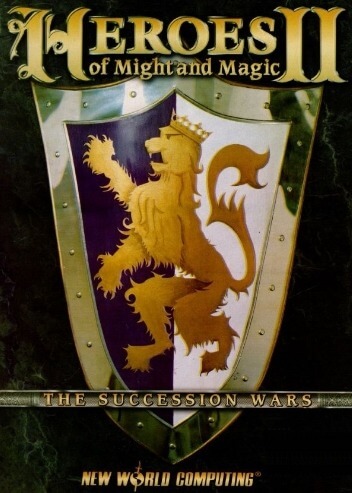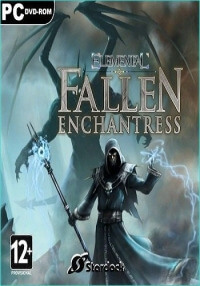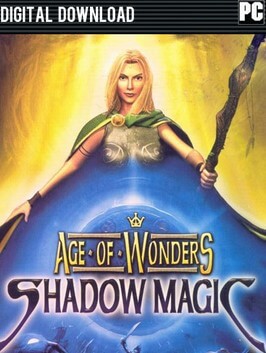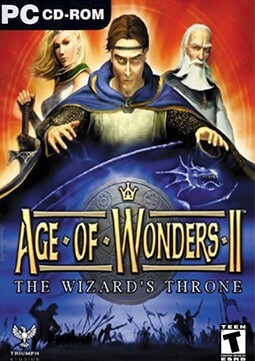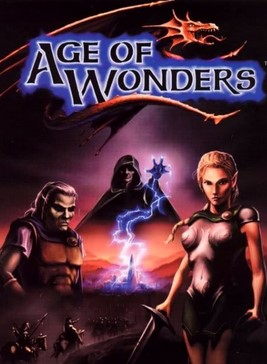Master of Magic splits spells into six schools of magic: Life Magic, which heals and protects; its antithesis Death Magic, which drains life and creates undead; Chaos Magic, which warps targets and spews destructive energies; Nature Magic, which controls the weather and turns it against the enemy; Sorcery, which manipulates the air and subverts the effects of the other schools; and Arcane Magic, which is a general school and free for all. Players select spellbooks from desired schools, allowing them to research and cast spells from said schools. The number of spells a wizard can learn from each school is dependent on the number of books chosen for that school.
Additionally, the player can select traits in addition to spellbooks. Traits provide special bonuses throughout the game.
There are global spells that affect targets throughout the world. Unit or city enhancement spells can boost the potential of its target, such as increasing the movement and attack speed of units, enabling them to regenerate wounds and increasing the power of their attacks. Wizards can summon creatures related to their schools. The player can research combat spells, which include direct attacks, debuffs and traps. The final spell learned is the Arcane Spell of Mastery, which takes enormous resources to research and cast but instantly wins the game for the casting player.
A tactical battle begins when two armies occupy the same square on the global map. The battle takes place in an isometric map that expands the contested square in detail (including fortifications and terrain aspects that affect movement and combat). The two forces are arrayed at opposite edges of the map and the battle is conducted in a series of turns. One side achieves victory by eliminating the other or forcing it to flee the combat; a draw occurs if both sides remain after 50 turns.
The player can recruit 86 unit types from the cities to build their armies. A few (such as swordsmen and archers) are generic, while others (such as troll shamans) feature racial bonuses (such as regeneration or flight) that make them more valuable or more powerful than generic units. Most city-recruited units are unique to the city's region or terrain and have special abilities like magic use, ranged attacks or an ability to always strike first in combat. Mercenaries can seek employment with famous wizards, allowing them to possibly recruit units which their cities are unable to produce. The player can even summon fantastic creatures, such as demon lords or enormous creatures like dragons. The variety of units with unique special abilities offer many options when building an army.
Many distinct heroes are available for players to hire or summon. Heroes have special abilities that boost the efficiency of other military units (like bestowing offensive or defensive bonuses) or allow the hero to perform special attacks, grant them immense strength or toughness, among other abilities.
Plot and setting
Master of Magic takes place across two worlds, Arcanus and Myrror. Arcanus is a land much like our Earth, with climatic zones and varied terrain like forests, oceans, grasslands and deserts. Myrror is a parallel world to Arcanus, featuring heavier magic use and fantastic flora, minerals and fauna not found on Arcanus. The two worlds are physically linked to each other by special portals called Towers of Wizardry, allowing units to travel between worlds.
Magic nodes - which are valuable sources of magical power - are scattered throughout both worlds. The worlds are populated by traditional fantasy races like elves and halflings, plus races which were introduced early to gaming via Simtex's games, like the insectoid Klackons.
Reception
Next Generation reviewed the PC version of the game, rating it three stars out of five, and stated that "Beginner players may have some trouble with the game's high level of complexity and often hard-to-follow instructions, but veterans will be satisfied."
Master of Magic was a nominee for Computer Gaming World's 1994 "Strategy Game of the Year" award, which ultimately went to UFO: Enemy Unknown.
Early versions of Master of Magic were riddled with bugs and had a terrible artificial intelligence (AI), frustrating a lot of reviewers with its crashes and ignorant enemies. Despite that, it was announced as the Runner-up Strategy Game of the Year by Strategy Plus magazine, coming in behind its older sibling Master of Orion. A few patches later, version 1.2 corrected a lot of the bugs and added some tweaks, but there were still game-crashing moments. Bill Cranston of GameBytes also savaged other aspects of the game, constantly comparing it against the 1991 hit Civilization. He said the gameplay was mostly repetitive clickings of the "end turn" button throughout several hundred eventless turns. Other complaints on his list also include Master of Magic's magic not being as crucial to winning the game in a straightforward manner, as compared to Civilization's technology. The potential of racial strife was less than fulfilled as military units of different races can co-exist harmoniously even though subjugated cities of a different race can rise up in rebellion. Coming Soon Magazine! however reviewed the same version and called it a must-have for strategy fans with great gameplay and lots of spells.
Master of Magic version 1.31 was released in March 1995. It rectified many more bugs and implemented a few changes to the AI. IGN reviewed this version of Master of Magic in 2002 and stated that the ability to customize the player's character, random maps and vast variety of spells and creatures give an immense replayability to the game. The dual planes concept and intense tactical battles spiced with spells, encouraged them to name the latest version of the game as the best fantasy strategy game ever made. Computer Gaming World called this version fantastic and named it as #141 of their "150 Best Games of All Time". Similarly, IGN placed the game as one of their "Top 25 Games of All Time" in 2000 and "Top 100 Games of All Time" in 2003, praising it for its innovative simultaneous play of two worlds. Tracy Baker wrote in Computer Gaming Classics named it as a strategy game classic for its success in implementing the mechanics of Master of Orion in a fantasy setting.
Master of Magic was inducted into GameSpy's Hall of Fame in 2000, with the network describing it as a visually stunning game with "enduring replayability", due to its randomness and large variety of spells. GameSpy also credited the game with being more popular than Master of Orion and responsible for making Steve Barcia and Simtex household names. Computer Gaming World also inducted Master of Magic into its Hall of Fame in 2005. The game has also been referenced as a representative product of MicroProse in gaming reviews. The writer Alan Emrich, responsible for coining the "4X genre" term, has placed Master of Magic in the top position on his "Games of All Time" list in 2001.
